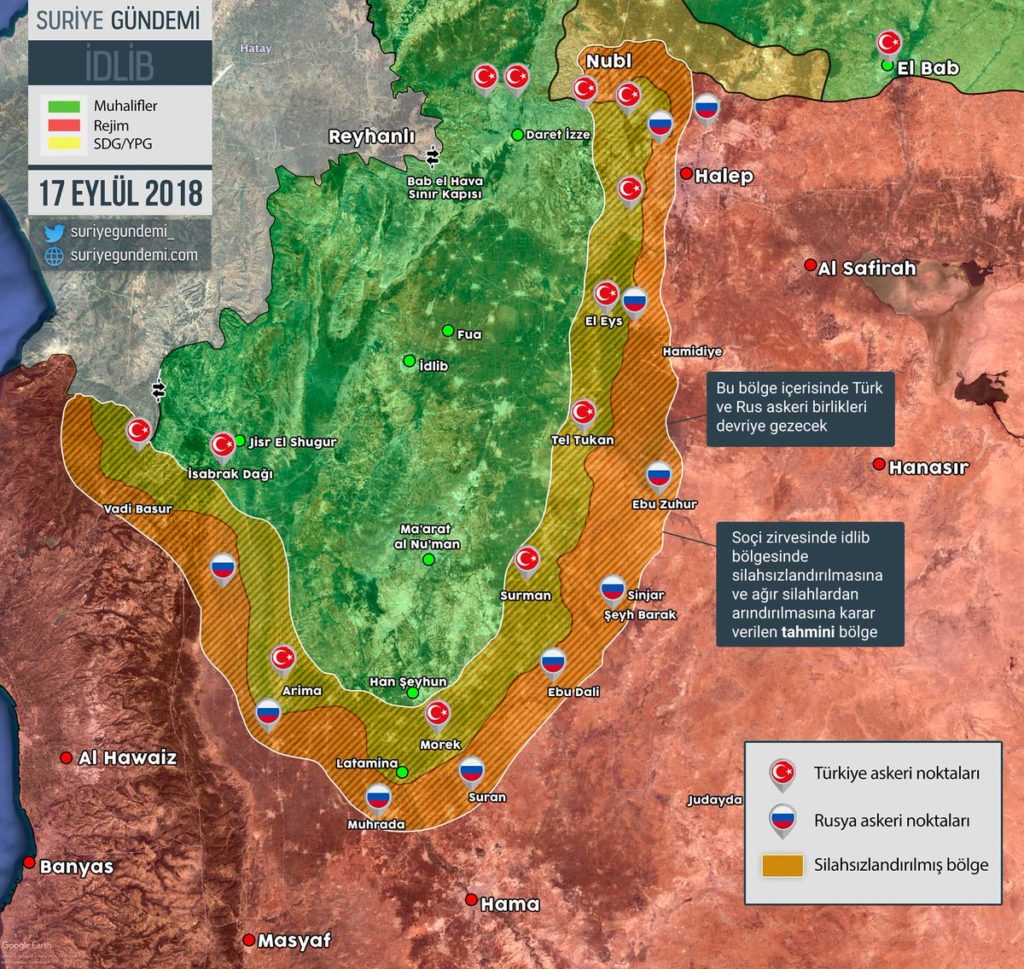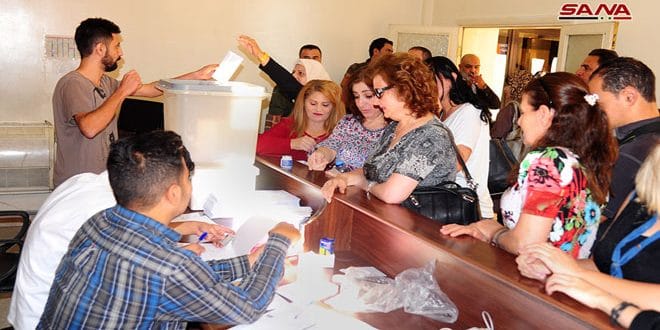Regime seeks authority with vote — but response limited
MONDAY FEATURE
Israel’s Message to Assad: Our Missiles Know Where You Live
UPDATE 2100 GMT: Reports say missiles have been fired on sites across regime-held Latakia and Tartous Provinces in western Syria tonight.
Huge explosions following missile attack & air defenses fired over #Latakia & #Tartus provinces tonight. 1 pic.twitter.com/rhBUhUq8Os
— Qalaat Al Mudiq (@QalaatAlMudiq) September 17, 2018
Residents say air defenses were active, including from the Russian base at Hmeimim.
Assad regime military personnel are claiming the attack was from the Mediterranean, in a coordinated operation between the Israeli air force and US and British ships, with 28 cruise missiles fired. One military source said there were 10 casualties so far.
Pentagon spokesman Navy Cmdr. Sean Robertson tells VOA on Syrian claims of engaging missile targets over #Latakia "I can unequivocally say this is not us." #BREAKING @VOANews
— Carla Babb (@CarlaBabbVOA) September 17, 2018
UPDATE 1745 GMT: Russia and Turkey have announced an agreement over northwest Syria suspending a Russian-regime offensive and declaring a 15-20 km (9-12.5 mile) buffer zone between opposition- and regime-held areas.
The statement follows a meeting between Turkish President Recep Tayyip Erdoğan and Russian counterpart Vladimir Putin in the Russian Black Sea resort of Sochi.
The agreement says the jihadist bloc of Hay’at Tahrir al-Sham will leave the demilitarized zone, to be patrolled by Russian and Turkish forces.
It is not clear which rebel factions will have to depart. The lines of the zone are also still to be confirmed, although Turkey has produced a map which it says represents the agreement.

ORIGINAL ENTRY: The Assad regime has hailed the first local elections in parts of Syria since the start of the Syrian uprising in March 2011 — but more than half of the country’s citizens could not vote.
More than 40,000 candidates were registered for 18,478 seats on administrative councils. State news agency SANA proclaimed that voting was extended by five hours until midnight (2100 GMT) because of “high participation”.
However, SANA gave no figures for turnout. More than six million Syrian refugees and more than five million internally displaced people — a majority of the country’s pre-uprising population of 22 million — could not participate.
Regime media put out similar declarations in the managed Presidential election of 2014, when Bashar al-Assad was awarded 88.7% of the declared vote against two token opponents.
State TV broadcast footage of polling stations around Damascus and in the coastal cities of Tartous and Latakia, with voters dropping their ballots into plastic boxes as election officials watched. There were also images from Deir ez-Zor city in eastern Syria, where the Islamic State was ejected last year in parallel offensives by pro-Assad forces and by the US-supported, Kurdish-led Syrian Democratic Forces.
But correspondents of the AFP news agency said there appeared to be fewer people at the polls than in previous Presidential or Parliamentary elections.
A large majority of the candidates are members of Assad’s Ba’ath party or affiliated to it.
“Why vote? Will anything change? Let’s be honest,” said Humam, a 38-year-old working in the capital’s Mezzeh district. “Everyone knows the results are sealed in advance for a single party, whose members will win in a process that’s closer to an appointment than it is to an election.”
There was no voting in areas outside regime control. These include parts of northern and eastern Syria overseen by Kurdish groups — about 1/3 of Syrian territory — and opposition-held Idlib, northern Hama, and western Aleppo Provinces.
Those opposition areas are under threat from a possible Russian-regime offensive, which has been checked so far by Turkish resistance. Idlib Province alone has an estimated three million people, with the UN projecting that up to 800,000 could be displaced by air and ground assaults.
Syria Daily, Sept 15: 10,000s in Idlib Rallies Against Russia-Regime Offensive
Turkish President Recep Tayyip Erdoğan, who held Ankara’s line against his Russian and Iranian counterparts Vladimir Putin and Hassan Rouhani 10 days ago, meets Putin in the Black Sea resort city of Sochi on Monday.
Council members serve four-year terms at the municipal level, with responsibilities for service provision and other administrative matters. The regime has declared that their duties will increase, with more involvement in reconstruction and urban development.


Apparently a deal between Turkey and russia in Sochi which would create a 15-20 km deep demilitarized zone in Greater Idlib.
This would mean that idlib region would remain under rebel/turk control. Will HTS agree? I think its mostly in their interest to agree on it. Will be interesting if this demilitarized zone would be carved inside rebel territory or even the regime’s. As of today Idlib offensive becomes less of a possibility.
https://twitter.com/QalaatAlMudiq/status/1041727276113641473
And infact russian sources say there will be NO idlib offensive. Regime supporters must be fuming with anger. Syria’s territorial partition adds another chapter today.
Source is russian defence minister
https://twitter.com/ZeinakhodrAljaz/status/1041729076610965504
Hahaha 2 cents propaganda on full chaff in here lately…..hilarious.
Not really sure what you expect Assad to do when he’s not in control of a 1/3rd of his country. There needs to be an end to the war first before there can be anything like a fair election, which should also be overseen by the international community. The only way that is going to happen is if the ‘rebels’ put down their weapons, but we know that also isn’t going to happen because the ‘rebels’ are mainly fanatical Islamists and terrorist groups who saw an opportunity to seize power in 2011 and they will only give up when they are defeated.
We also have Turkey supplying weapons and military equipment to those terrorist groups (the US even admits those in control of Idlib are terrorists) which will only serve to prolong the remaining conflict and cause yet more suffering.
Yeah, the problem is Turkey isn’t giving them enough weapons
A lot has been done in the last month. And more comes daily. Never enough considering who you have on the other side.
“Not really sure what you expect Assad to do when he’s not in control of a 1/3rd of *his country*. ”
I’d expect him to realize that it isn’t *his* country… and that it belongs to all Syrians.
But given that he thinks it is his personal property, he’s doing about what I would expect.
https://twitter.com/QalaatAlMudiq/status/1041590622002532352
Aftermath of Israeli airstrike on damascus airport. 747 cargo in ashes and damage to nearby facilities. Delilah ordinances most probably, fired from far away……..